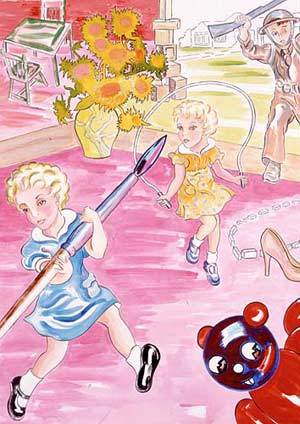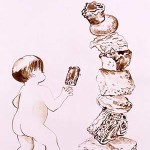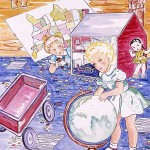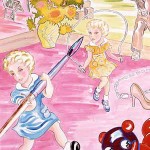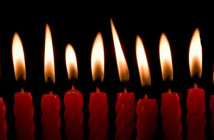The American childhood is a much discussed institution, often held up as something to be protected against the loss of innocence that is adulthood. Thus we put warnings on music and ratings on movies, and spoon-feed Disney and Dr. Seuss because they are safe and simple and avoid looking at adulthood in any realistic light. In Europe, and particularly the Germanic countries, the view is much different. Consider "Max and Moritz" or the original Grimm fairy tales (in which Hansel and Gretel are eaten), and you will find a version of childhood that must be molded, trained for adulthood, and prepared for the worst. One will never find the lessons of "Max and Moritz" in "Go, Dog, Go."
In her show Coloring Book Hybrids: An Artist Reinterprets Childhood, Karen Moss presents a series of paintings both naive and morbid. They show the simple games of children and their imagined playmates in vivid color, both surreal and yet comfortable, a blending of the expected with the strange that adults hope will appeal to children.
Moss' images are at their best when they focus on the types of indoctrination children receive from their imagery. In one, a girl lugs a heavy paintbrush while a boy charges in WWI-era military gear. In another, girls study the globe and play with dolls while boys play at war in the background. Here, Moss pushes her layering of adult interpretaion on top of the childish fantasy, as the WWI-era soldier points his rifle at a boy playing Indian, showing us how the boys can easily meld historical eras in their games while the girls attempted studies of geography are foiled by an upside-down map. They are playing at historical roles, certainly, but in no way educated about the horrors of war, the plight of native peoples, or even simple geography. One is left with the impression that the only toys in the image in which the children can truly engage and understand are the gun and the doll-house; male violence and female docility.
The gallery website states: "Karen Moss' exhibition consists of work from both the "Life Before TV" and "Coloring Book Hybrids: An Artist Reinterprets Childhood" series. Moss finds inspiration for both bodies of work in coloring books of the 40's and 50's as well as in the memories of her own childhood as a precocious young artist."
The idea of "Life Before TV" proposes that the viewers of this work were actually alive and experiencing their childhood memories prior to television's dominance, which excludes all of the late- and post-Baby-Boomers who might view this work. It is an idea that imagines the Eisenhower era as the perfect time in American culture, something we must return to, and an ideal to be achieved. Much of the contemporary political dialogue, particularly around children, posits this era as a golden age, yet one must point out that it is gone and never to return. "Life Before TV" is something less and less of mainstream culture could have experienced. Many of us would feel excluded from "Live Before Computers", "Life Before the Internet" or "Life Before Video Games."
This is not to say that Moss' images are not readable, nor are they displeasing. Simply, they are invoking a time that many of us only know second-hand, via our Baby Boomer parents and their boxes of childhood toys kept by our grandparents to entertain us at holidays. A boy playing a WWI soldier looks terribly out of date to a person born after the fall of Saigon, or during the Gulf War. In this way, they do not reinterpret any childhood since the 1950s, but instead invoke a nostalgia for a childhood imagined or remembered, and then proceed to deconstruct it.
Moss' reinterpretations of coloring books provide an interesting view of her perception of childhood, and how even the most ardent attempts to keep adulthood away from children still ultimately find form and presence through games and study. Her images do not say much that we have not heard from other artists on the subject of children and their supposed innocence. Still, they are beautiful, lively and engaging works that are worthy of your time.
Links:
Pepper Gallery
"Karen Moss: Coloring Book Hybrids" is on view September 8 - October7, 2006 at Pepper Gallery.
All images are courtesy of the artist and Pepper Gallery.

